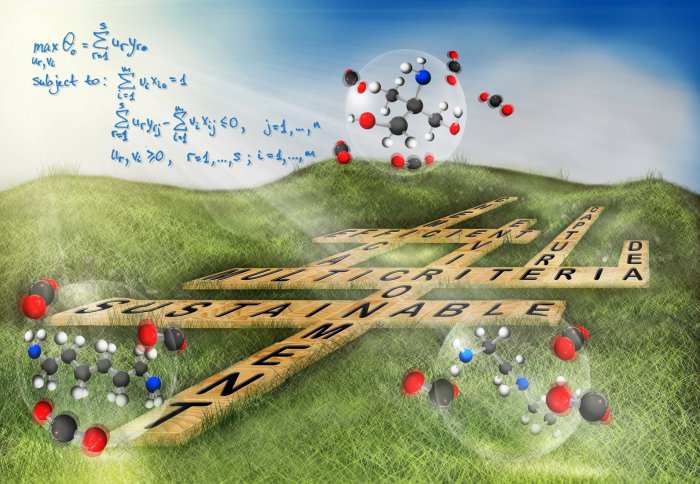Using microeconomics to optimise chemicals

New Imperial-led research uses a decision-making tool developed in microeconomics to identify the most efficient and sustainable chemicals
Designing sustainable products and processes is one of the key issues concerning the present chemical industry. New products are launched every day, and tools that are capable of determining if a given product enhances the overall level of sustainability are increasingly becoming essential. Scientists and engineers need to compare solvents, additives and other chemicals in terms of economic, technical and environmental aspects simultaneously, while also taking conflicting thermodynamic properties and environmental metrics into consideration.
Now, research led by Dr Gonzalo Guillén-Gosálbez, a Reader in the Department of Chemical Engineering at Imperial College London, has led to the development of a new systematic approach which is able to identify the most efficient chemicals while also establishing improvement targets for those found to be inefficient. The findings were published today in an article in the leading journal Green Chemistry, titled "Multi-criteria screening of chemicals considering thermodynamic and life cycle assessment metrics via data envelopment analysis: Application to CO2 capture". In it the authors describe a new method based on Data Envelopment Analysis (DEA), a technique developed in microeconomics which has never been applied to green chemistry before. This method, unlike other similar ones, does not require any weighting of the assessment criteria: it is a non-parametric analytical tool for quantifying the relative efficiency of units, using linear programming.
This tool can play a key role in the transition towards a greener chemical industry
– Dr Gonzalo Guillén-Gosálbez
Reader, Department of Chemical Engineering
The authors demonstrate the power of the DEA method using a case study of amine-based solvents for carbon dioxide capture. These solvents are the most commonly used absorbents due to their high capacity to react with carbon dioxide, however, they are also highly volatile and require large amounts of energy to regenerate, which raises operational, safety and environmental questions. In the paper, they compare 125 different amine-based solvents for carbon dioxide capture using 10 performance indicators such as heat capacity, viscosity, surface tension and acute toxicity. The method not only identifies key inefficiencies but also ranks the best chemicals according to a systematic, objective criterion without using weights on the performance indicators.
Dr Gonzalo Guillén-Gosálbez, said "This tool, based on mathematical models originally developed in microeconomics to construct production frontiers for technologies, can assist in the design of more sustainable chemicals in a wide variety of applications, from bulk to fine chemicals, thereby playing a key role in the transition towards a greener chemical industry. It provides valuable insight into screening problems by identifying optimal chemicals and by providing improvement targets for suboptimal ones, which can guide research efforts during the early stages of the development of new products and processes."
The work described in the paper poses the problem of screening chemicals as a multi-criteria decision-making problem. In doing so, this conceptual framework can help with the selection of efficient chemicals in the development of sustainable processes. The new tool could potentially have a major impact on industry as it encourages sustainable practice while reducing costs. The researchers are planning to extend the approach to deal with the assessment of chemical flowsheets in the future, with an emphasis on the production of biofuels.
Reference:
[Article co-written with Dora Olah an Undergraduate student in the Department of Chemical Engineering.]
Header photo credit: Víctor Tulus.
Article text (excluding photos or graphics) © Imperial College London.
Photos and graphics subject to third party copyright used with permission or © Imperial College London.
Reporter
Michael Panagopulos
Department of Chemical Engineering